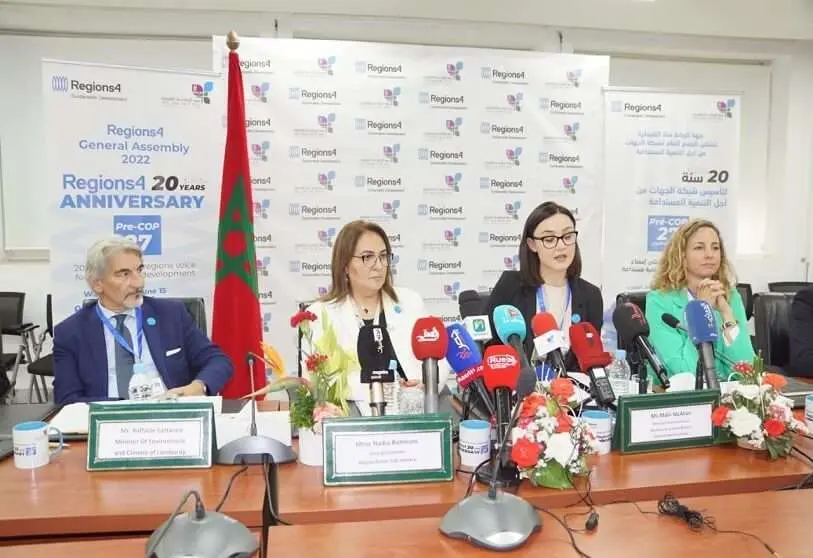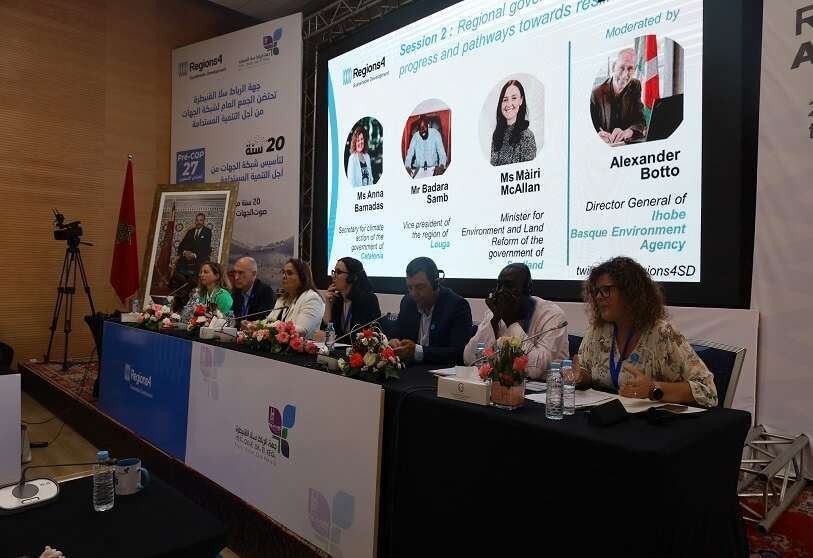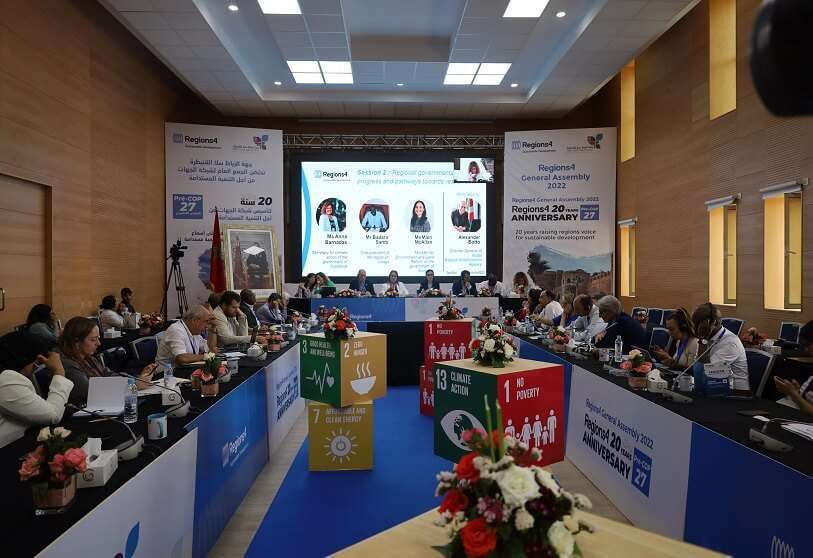Regions4 pide que en la COP27 se reconozca a los gobiernos regionales “como impulsores clave del desarrollo sostenible y la acción climática”

'Regions towards a resilient future: implementing multi-level action on the ground', a preparatory event for COP27 of the international network of regional governments Regions4, was held this week with the presence of fifty regions in attendance. They shared the strategies and measures they are implementing at sub-national level, with the aim of meeting global targets together and having their voice represented in global fora. The event, held on the 15th and 16th in Rabat (Morocco), coincided with the 20th anniversary of the network and the celebration of its General Assembly.
Regions4 is made up of 41 regions from 21 countries in 4 continents, and is currently chaired by the Basque Country. In these 20 years, it has been their voice in UN negotiations, European Union initiatives and global discussions on sustainability and the environment. To celebrate this trajectory and address the importance of its leadership in the path towards the resilience of the planet, the main political leaders at regional level have shared success stories, good practices and visions for the future in Rabat.
Member regions and associations from all over the world were present, as well as some invited guests: Rabat-Salé-Kénitra, Association Regions Maroc and Fez-Mequinez Morocco; Communauté des Communes de Plateau, Benin; Hauts Bassins and Centre-Nord, Burkina Faso; Louga, Gossas and Saint-Louis, Senegal; Euskadi, Navarra, La Rioja and Catalonia, Spain; Brittany, La Réunion and Auvergne-Rhône-Alpes, France; Flanders and Brussels, Belgium; Scotland, UK; Lombardy, Italy; Åland Islands, Finland; Guanajuato, Jalisco and Yucatan, Mexico; Rio de Janeiro, Santos and Sao Paulo, Brazil; Quebec, Canada; CONGOPE and provinces of Ecuador; Maharashtra, India; South Australia, North Carolina, USA; Nouakchott, Mauritania; Segou, Mali; and Cross River State, Nigeria. In total, more than a hundred policy and technical representatives from these regions attended both in person and online.
At the event, the draft of the 'Rabat-Salé-Kénitra Declaration of Regional Governments towards COP27' was presented, a joint testimony that they will take to the summit in Egypt with the aim of claiming their presence in global decision-making. In the text, which is open to new contributions, the regions call for "regional governments to be recognised as key drivers of sustainable development and climate action". They also commit "to accelerate our actions and the localisation of global goals by leveraging innovative solutions to enhance biodiversity conservation and promote climate change adaptation and mitigation".
The regions affirm that "transformative change is needed to achieve the Sustainable Development Goals, including a system-wide reorganisation to put the value of nature at the heart of UN agendas". They are also aware of their responsibility: "We, sub-national governments, recognise our key role in responding to the climate crisis and biodiversity loss, and the need for urgent action on climate change mitigation and adaptation, towards a more sustainable, equitable and healthy world for all," the declaration calls for.
Therefore, the regions will call at COP27 in Egypt for "achieving net zero emissions, leading the way towards adaptation and resilience (including sub-national governments in decision-making, implementation and monitoring), contributing to the Global Adaptation Goal and the Global Climate Assessment, mobilising finance for adaptation and resilience, and connecting agendas towards resilience". Finally, they offer their experience, expertise and capacities to implement an integrated approach to climate action.
The declaration is a draft open for contributions and can be signed by the regions until 30 October.

Arantxa Tapia, Minister of Economic Development, Sustainability and Environment of the Basque Government and President of Regions4, opened the session by recalling: "We are celebrating 20 years of Regions4, an alliance that brings together nearly 200 regions to work collectively in the search for solutions to the great global challenges: climate crisis, biodiversity loss and sustainability. Our political advocacy, cooperation and action in our territories are the basis for leading a truly transformative global governance, with solidarity and sustainable development as fundamental pillars".
This was followed by a discussion on the basis on which the different existing networks operate and the opportunities they offer. Sophie De Coninck, Manager of the Local Climate Adaptive Living Facility (LoCAL) - United Nations Capital Development Fund (UNCDF), remarked that "it is very important that regional governments are represented at COP27". She was followed by Kata Tutto, chair of the Green Deal Going Local working group - ENVE commission of the Committee of the Regions of Europe, highlighting the "building of global communities with local ambitions that want cities to be taken into account", with tools such as the Covenant of Mayors.
Natalia Uribe, Secretary General of Regions4, moderated the first of the panels, where three regional governments shared the actions they are implementing to accelerate the road to resilience. The first of these was from La Rioja, with the Regional Minister for Sustainability and Ecological Transition, Alejandro Dorado; the second, with the Vice-President of the Rabat Salé Kenitra region, Mustapha Jawadi; and the third, from Jalisco, with Sergio Graf, Secretary for the Environment and Territorial Development. All agreed that their regions are developing plans and strategies that promote renewable energies, that consider adaptation to climate change, the circular economy, decarbonisation, that avoid the loss of biodiversity... in order to make them cross-cutting tools in their regional policies. Problems arising from an already tangible change were also shared; in the case of Morocco, water scarcity, as it is one of the countries with the least amount of drinking water per inhabitant.
The second panel, on recommendations for accelerating the implementation of resilient actions, was moderated by the Director General of Ihobe-Basque Environment Agency of the Basque Government, Alexander Boto. It included presentations by the Secretary for Climate Action of Catalonia, Anna Barnadas; Badara Samb, Vice-President of the Louga Region, Senegal; and Màiri McAllan, Minister for Environment and Land Reform of the Scottish Government. Barnadas listed some priorities for sustainable development, such as the protection of a diverse landscape and the distribution of the population (almost all of which is concentrated in urban areas, which make up only 6% of the Catalan territory). Samb spoke of how in his region it is essential to have an agricultural strategy and to propose joint projects and solutions that cover "common needs that do not leave the problem of climate change to others". McAllan stressed the need to measure the losses and damage caused by climate change, something that is already being experienced, especially in vulnerable regions, and stressed that "its importance must be underlined in the international community".

The Rabat meeting began on Wednesday afternoon, with a high-level political meeting where impressions and doubts were shared through a debate. The meeting highlighted the achievements of the past 20 years, including bringing together a community of nearly 200 regional governments to work collectively, bringing their voice to key global forums on sustainability and the environment, and gaining recognition for their role in implementing innovative policies and solutions for the resilience of the planet.
However, regions continue to look to the future, a more resilient future where they lead the fight against climate change. Therefore, questions also arose, such as whether to agree on common objectives, a common roadmap or to value the co-creation of projects by geographical areas to generate knowledge with the option of replication in other areas.
The president of Regions4, Arantxa Tapia, concluded in this session that "Regions4 is a brand that makes us stronger, that gives us value. It is a symbol of prestige. Let's use it intelligently, to grow more; to go further".
The annual General Assembly took place yesterday morning. President Tapia opened the session by highlighting "the key role" that regional governments have achieved "in the implementation of innovative policies and solutions for the resilience of the planet".
According to Tapia, this has been achieved thanks to four axes: "Firstly, advocacy, presence and active participation in the main United Nations forums; secondly, cooperation, as Regions4 interacts with more than 200 regional governments around the world, representing millions of people, institutions, social agents and companies; thirdly, the impact, both qualitative and quantitative, of the thousands of actions carried out to adapt our territories and ecosystems; and finally, the perspective of co-responsibility, a collective multilateral cooperation that responds to the most urgent global crises".

2022 is a year of milestones: it is the 50th anniversary of the United Nations Conference on the Human Environment held in Stockholm in 1972, which created the United Nations Environment Programme (UNEP). It is also the 30th anniversary of the United Nations Conference on Environment and Development held in Rio de Janeiro in 1992, which was the first step towards the United Nations Framework Convention on Climate Change (UNFCCC). At the same time, Regions4 Sustainable Development is 20 years old.








